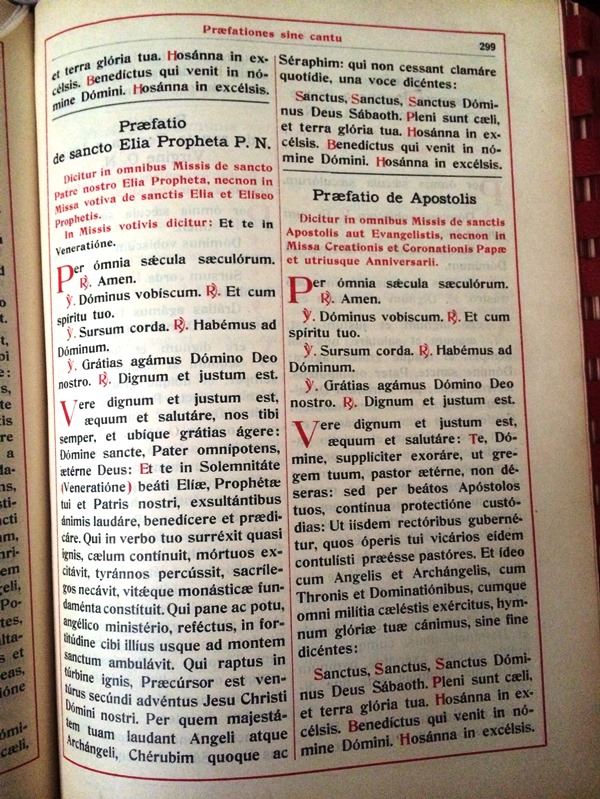Many of the great figures of the Old Testament are considered saints and have a day in the Roman liturgical book called the Roman Martyrology. I post about them on occasion.
The Martyrology says that when the day is clear on the regular calendar – id est there is not even an obligatory memorial – a saint of the day in the Martyrology can be selected.
Here is the entry for St. Elijah, prophet, in the Roman Martyrology:
2. Commemoratio sancti Eliae Thesbitae, qui propheta Domini in diebus Achab, regis Israel, Dei unici iura vinidicavit adversus infidelem populum tali animi robore, ut non modo Ioannem Baptistam, sed etiam Christum ipsum praefiguret; oracula scripta non reliquit, sed eius memoria fideliter servatur, praesertim in monte Carmelo.
In the older, traditional Roman calendar, I think we must use St. Jerome Emiliani. In the newer calendar, I think we are freer, since there is only an optional memorial for St. Apollinaris.
Problem: Where to find the texts for Mass for St. Elijah?
Since the Carmelites venerate him, they have Mass texts.
Could Fr. Sven O’Brien use them at the diocesan parish of St. Ipsidipsy in Black Duck?
He could probably ask permission of the local Bishop of Black Duck.
In any event, here is the spiffy preface which a reader sent:
Preface of Our Father, S. Elijah the Prophet: Right indeed it is and just, proper and for our welfare, that we should always and everywhere give thanks to you, holy Lord, almighty Father, eternal God; and that we should triumphantly praise, bless, and proclaim you on this solemn feast of blessed Elijah, your Prophet and our father: who, at your word, arose like fire, closed the sky, raised the dead, smote the tyrants, killed the impious, and laid the foundations of the monastic life; who, fed with bread and drink by the ministry of an angel, walked in the strength of that food as far as the holy mountain; who was carried off in a whirlwind of fire, to return as a herald of the second coming of Jesus Christ our Lord; through whom your majesty is praised by the Angels and the Archangels, by the Cherubim too and the Seraphim, who lift up their endless hymn, day by day, with one voice singing: Holy… [Not my translation.]
Finally, the mention of Elijah and Carmelites prompts me to remind you to refresh your coffee supply with
… Mystic Monk Coffee!
When you’ve hard a hard week of searching for Mass texts for Old Testament prophets until you look like Gandalf in the archives of Minas Tirith, you can still save the world from Sauron, and find your Mass formulary, by drinking lots of …
Do you not care about finding that long-lost parchment?
Do you not care about … about the liturgy?
Is it possible that you don’t care about saving the liturgy and saving THE WORLD?!?
What would Gandalf do? Would he order iced tea?!? Actually, that sounds pretty good today. The monks have tea, too.
Anyway…
Mystic Monk Coffee!
It’s swell!




































I’d argue the EF Mass for St. Elias could be said today in any parochial church where a Scapular Confraternity is erected.
Pingback: FRIDAY LATE EDITION – Big Pulpit
Gandalf the Grey:
[reading] The year 3434 of the Second Age. Here follows the account of Issac, the High Vicar of Black Duck, at the finding of the Brew of Power. “It has come to me, the One Brew. It shall be a pickup of my Diocese. All those who follow in my succession shall be bound to its fate, for I shall risk no hurt to the beans. It is precious to me, though I buy it with a great pain. The markings upon the mug begin to fade. The wakefullness, which at first was as clear as red flame, has all but disappeared – a secret now that only a refill can tell.”
Father,
I once heard, somewhere along the line, that Adam and Eve were traditionally thought to have been redeemed and freed from Limbo/Sheol by Christ along with the various Old Testament Saints. I don’t happen to know whether that’s just a pious opinion, definitive Church teaching, or… perhaps something in between? I’ve wondered for some time whether it’s permissible for Catholics to pray to our First Parents asking for their intercession as with other Saints; if they were saved in the end, it seems to me that they of all people would be fitting models of redemption and perhaps underappreciated intercessors (it would, after all, be… interesting… to meet them in Heaven someday, an eventuality of which folks seldom speak in my experience), no? I don’t suppose you could point me in the direction of answering such questions?
The Cobbler:
Yes Adam is a saint, known as a Patriarch whose Memorial is December 24. Check outhttp://catholicsaints.info/adam-the-patriarch/ for sources.
“Adam” would not be a common Christian name, if Adam was damned.
One of the errors of Tatian the early heretic [once a student of St Justin Martyr] was that Adam was damned.
Pious tradition says that Adam languished in sorrow in hell/limbo awaiting the redemption by Christ [God had told Adam that a redeemer would come] and that the first person Christ released from Hell was Adam.
Its interesting thought to meditate upon that Adam repented of the Original Sin that sent all of humanity into sorrow and Adam won heaven, while Judas sinned hugely as well, but despaired and died damned. If Adam can repent and be forgiven, who are we to despair of God’s mercy?
oops sorry I forgot to mention that Eve is also included in Adam’s story. Her Memorial is also December 24.
Among the zillions of sources discussing Adam and Eve, you can also read about the preternatural gifts of Adam, and what was preserved and lost after he sinned – there’s a section called ART. III. THE FALL AND ITS CONSEQUENCES in Fr. Tanqueray’s book “The Spiritual Life”. The author explains the origins of the spiritual life and how Adam affects our natural inclinations in battling sin. This tome can be found for free on the ‘net and is a powerful classic of spiritual direction from 1930.
Anyway…my 2 cents.